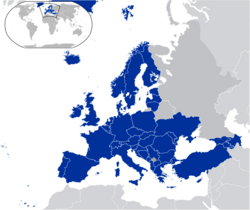Council of Europe
| Oh no, they're talking about Politics |
| Theory |
| Practice |
| Philosophies |
| Terms |
| As usual |
| Country sections |
|
|
The Council of Europe is an organisation of 46 countries in Europe. It includes almost all European countries, with the exception of Belarus, Russia, Vatican City, and some countries which lack full international recognition (such as Kosovo, South Ossetia or Abkhazia).
It mainly exists as a forum for discussion among the member governments, and as such has been a vehicle for the adoption of a wide range of treaties in many different areas. It is a bit like a European mini-United Nations. It also has a Parliamentary Assembly, which is elected by the Parliaments of the member states, and brings together parliamentarians to discuss issues.
In terms of substantive powers, its most notable institution is the European Court of Human Rights (ECHR) — citizens of member states can sue their governments in this court, claiming human rights violations. This is the most controversial aspect of the Council of Europe.
It should not be confused with the European Union, which is a separate body with a smaller membership but much greater powers. (However, the British tabloids do not understand the difference, and keep on calling the ECHR an "EU court", which it is not.) For added confusion, the European Union has two institutions — one called the Council of the European Union, the other the European Council — which again are unrelated to the Council of Europe.
The Council of Europe is older than the EU, having been established in 1949, while the earliest predecessors of the EU were not formed until 1958, and the EU did not exist under its current name until 1993. The Council of Europe was established as a looser, broader, low commitment grouping, that any European country could join, provided they meet minimum standards of democracy and human rights. During the Cold War its membership was restricted to the Western-allied European countries, but has since then been expanded to include most of the former Eastern bloc, which included Russia which joined in 1996 and left in 2022 following the invasion of Ukraine. This also led to the question of where "Europe" ends which the CoE has decided means territory west of the Ural river, meaning that Kazakhstan can join when it fulfills the CoE's democracy and human rights standards, but that Kyrgyzstan and Uzbekistan, presumably, cannot. The CoE has also come very close to kicking out a member state for human rights abuses, specifically Greece in the wake of the coup that brought in the Greek military junta of 1967–74![]() — although the junta withdrew Greek CoE membership to forestall being excluded.
— although the junta withdrew Greek CoE membership to forestall being excluded.
